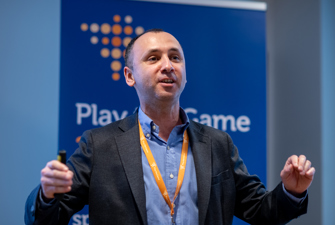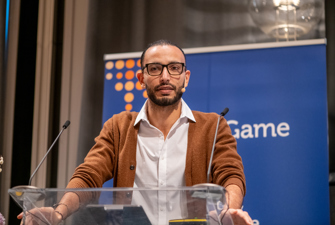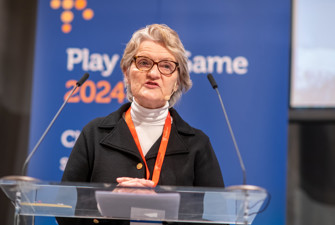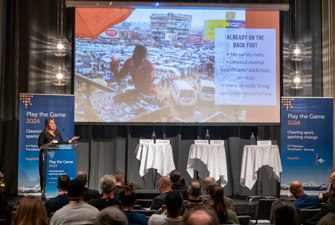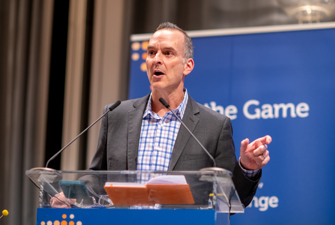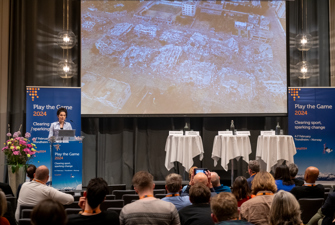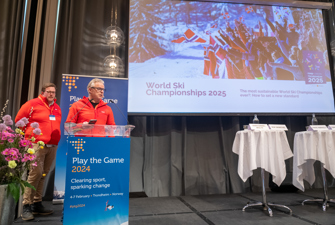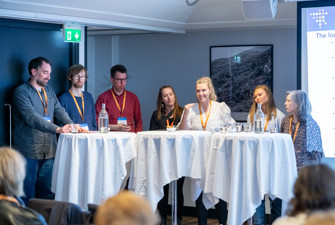The Russian doping scandal has exposed the weaknesses in the international anti-doping structure
On the final day of Play the Game 2024, the legacy of the Russian doping scandal came under scrutiny. Speakers pointed out that currently there are no legal mechanisms against states responsible for doping, and no way of publicly shaming them either.
State-sponsored doping by Russia was the biggest sports corruption scandal to emerge in his lifetime said Play the Game veteran and chair Andy Brown ahead of a panel that debated the lessons and legacy of the scandal.
“Do we have a legal mechanism when states are responsible for doping?” asked Faraz Shahlaei, an adjunct professor at Loyola Law School in the USA, rhetorically, before adding: “Private and public structures have failed in implementing meaningful actions."
“This is the problem with the anti-doping structure. We have a state that has violated every part of the convention but the convention does not provide any type of framework for sanctions. If they find a non-compliance case they are focusing on a corrective action plan and not any type of sanction. A convention that has no enforcement capabilities is at best a very weak convention.”
“A second problem is a lack of dispute resolution. The biggest problem is the lack of recognition for those who have been the victim of any type of doping. The first step of reforming the WADA code is to help those clean athletes who have lost out.”
Public shaming of states does not exist
The multilateral International Convention Against Doping in Sport treaty established in 2005 by the United Nations Educational, Scientific and Cultural Organization (UNESCO) was discussed and found currently ineffective.
“Public shaming of states does not exist yet,” suggested David Pavot, a professor of sports law at the Université de Sherbrooke in Canada, in his presentation addressing 'States and doping: Towards an extended responsibility?'.
To strengthen this treaty, UNESCO could request an advisory opinion from the International Court of Justice (ICJ) on what defines a state-sponsored doping regime.
“It would be possible for the ICJ to establish that the Russian doping regime was a violation of human rights,” said Pavot.
The Rodchenkov Act could be a deterrent
The newest approach to doping control is the Rodchenkov Anti‐Doping Act in the United States, which can be an effective deterrent suggested professor Genevieve Birren from the State University of New York.
“The closest we have to this is the foreign and corrupt practices act. This has served as a model law for other countries, and I think this is what will happen with the Rodchenkov anti-doping act. It will serve more as a deterrent and there will not be hundreds of prosecutions.”
Two indictments were secured in December 2023 but one filed a constitutional challenge to the RADA act.“
Although this failed, I think we will see more of this,” added Birren, who went on to explain:
“The court said that the drugs were on the WADA list when the law was passed, but five years down the line if there is a new code with a drug that was not on the code when the RADA act was passed and we then charge them with that drug, will the prosecution stand? A solution would be to reissue the RADA Act every time the WADA list is updated. I’m not optimistic about that.”
“Enforcement outside would also be a problem. We are going to have to see how it goes as it’s very new. Down the road, we may see challenges and end up killing this law with our own internal constitutional challenges.”
Sanctions of Russia-friendly nations could work
A Russian perspective on the scandal was provided through research from Aya Sadamasu, a football physician and researcher from Chiba University in Japan. In a survey she found that 27 per cent of respondents found Western media exaggerated the issue.
“Some people also said that [Russian] athletes cannot win the Games without doping because other athletes will have already doped,” explained Sadamasu.
The research concluded that some Russians view the scandal as a tactic by the West, but even if Russia tries to be apart from the Olympic movement and create another sports world for the BRICS countries of Brazil, Russia, India, China and South Africa, then doping control should be applied by WADA and sanctions considered.
Sadamasu added: “Sanctions of Russian-friendly nations that participate in the Russian-led sports world would be effective.

